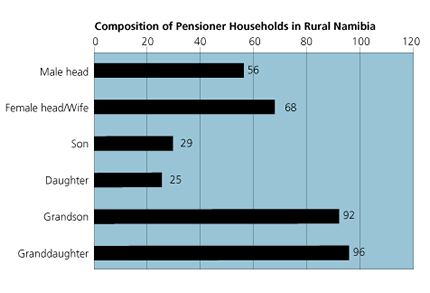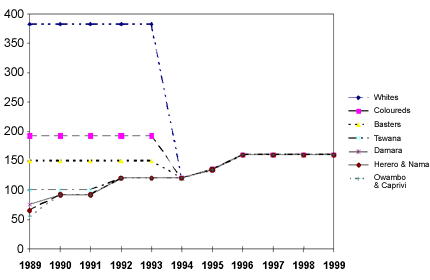
back
Some
related articles :
|
 |
Future
uncertain
Social pensions in Southern Africa
By: Stephen
Devereux
Institute of Development Studies, June 2002
Only three countries in sub Saharan
Africa - South Africa, Namibia and Botswana - provide non contributory
social pensions for their elderly citizens. In South Africa there are over
1.6 million social pensioners, each receiving R600 (about £39) per month.
Namibia's 85,000 social pensioners receive a much lower N$250 (about £16),
comparable to Botswana's 110 Pula (about £12), which is paid to 80,000
social pensioners each month.
Despite their long history and
important social and economic impacts, remarkably little is known about
these programmes. In February 2002, The Economist mistakenly accredited
South Africa's ANC government with introducing the social pension, when in
fact it dates back to 1928 in South Africa and 1949 in Namibia (South
Africa occupied and administered Namibia - then South-West Africa - from
1920 to 1990). Originally motivated by a combination of welfarist and
political objectives, including controlling African urbanisation and
'winning hearts and minds' during the apartheid era, the social pension
nowadays has explicit anti-poverty objectives. It sustains over a million
poor South Africans and Namibians, and is having a comparable impact in
Botswana, where it was introduced in 1997.
Social safety net
In all three countries, the social pension injects substantial volumes of
cash into poor households and communities. It has stimulated trade and
marketing infrastructure, helped stabilise rural food supplies, and
reduced vulnerability by providing a 'safety net' against livelihood
shocks such as drought. Surveys in South Africa and Namibia have found
that pension-dependent households are better off than small farmers. Since
eligibility is activated by an age milestone rather than retirement, the
incomes of the poor actually increase on reaching 60 years of age. The
social pension even lifts many households out of poverty altogether.
Apart from pensioners themselves, the
social pension supports unemployed adults, young grandchildren and other
relatives. It has also contributed to high numbers of 'missing middle
generation' households in rural communities. Typically, young adults move
to town in search of work, leaving their parents to care for their
children in the village, where the cost of living is lower. A strikingly
high percentage of social pension income is spent on schooling expenses.
Increasingly, the pension is providing vital support to relatives affected
by HIV/AIDS, with many elderly people fostering AIDS orphans. A positive
consequence is that the pension makes elderly relatives economically
independent and valuable family members, contradicting the widespread
perception that they are financial burdens on their offspring

Rising costs
During the apartheid years, white South Africans and Namibians received
substantially higher social pension payments than blacks, but these
racially discriminatory practices were declared unconstitutional after
both countries' transition to democracy in the 1990s. The equalisation of
social pension payments, together with extended coverage in the former
bantustans (small pockets of land the apartheid government set aside for
the black populations where they were given limited self-government), the
introduction of a high-tech computerised mobile delivery system and
pressures to raise the real value of the pension, have all contributed to
rising programme costs. The World Bank has recently raised concerns about
its fiscal sustainability. The social pension costs the South African
government R7 billion (£600 million) per annum, and amounts to 4.8% of
total government spending in Namibia.
Monthly social pension payment
rates in Namibia, 1989-1999

On the other hand, decisions about how to allocate public spending are
political choices, not technical imperatives. In this light, a more
pertinent question is whether political commitment to the social pension
is diminishing. Namibia's Minister for Health and Social Services has
denounced the social pension as 'nothing but a subsidy to liquor stores'
and, in South Africa, the social pension risks being subsumed into an
'integrated' social welfare system. Therefore, despite their impressive
achievements, the future of social pensions in southern Africa is
uncertain.
FAIR USE NOTICE: This
page contains copyrighted material the use of which has not been
specifically authorized by the copyright owner. Global Action on Aging
distributes this material without profit to those who have expressed a
prior interest in receiving the included information for research and
educational purposes. We believe this constitutes a fair use of any such
copyrighted material as provided for in 17 U.S.C § 107. If you wish to
use copyrighted material from this site for purposes of your own that go
beyond fair use, you must obtain permission from the copyright owner.
|

